Other than keeping your popsicles and frozen veggies frosty, who would have thought that your everyday freezer had so many uses? Just like your dishwasher can be used for many non-cookware items, the freezer can be used in a variety of useful ways that don't involve perishable food.
Store batteries in the freezer to prolong their life. Open a sealed envelope without ripping the paper. If you loathe the idea of sticking your beloved jeans into a washer and dryer, give it an icy cleaning session by sticking a pair into a ziploc bag, storing for a week and thawing it out until read to wear. According to some jean enthusiasts, doing so kills bacteria and deodorizes smell, making it the ideal way to "wash" your jeans without any wear and tear.
And for the worst case scenario: when your computer has crashed and you are desperate to recover your saved files, many tech geeks have sworn by the method of removing the hard drive from the computer, sticking it into the freezer for a couple of hours, and putting it back in the computer to turn it on long enough to recover your data before dies again.
Click on image to enlarge.
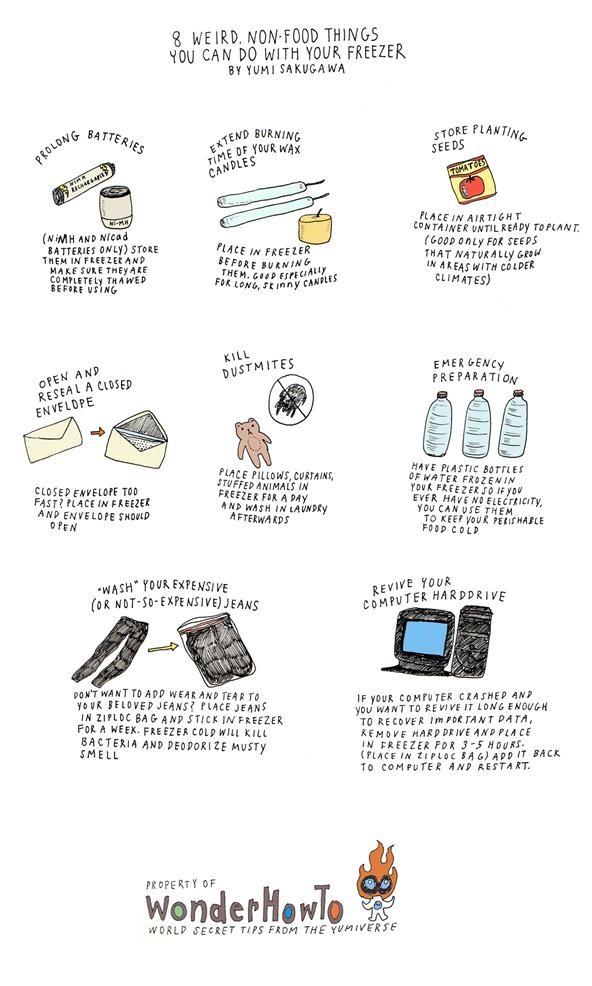
Just updated your iPhone? You'll find new emoji, enhanced security, podcast transcripts, Apple Cash virtual numbers, and other useful features. There are even new additions hidden within Safari. Find out what's new and changed on your iPhone with the iOS 17.4 update.



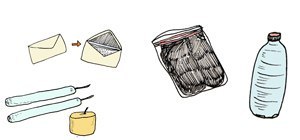
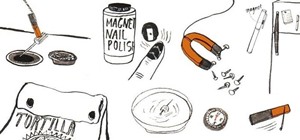
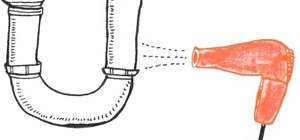
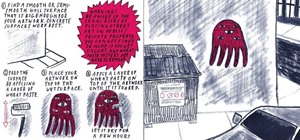



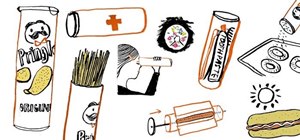
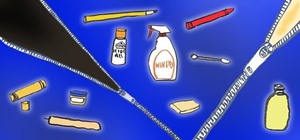
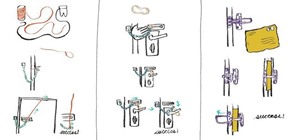
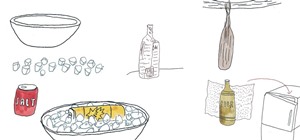
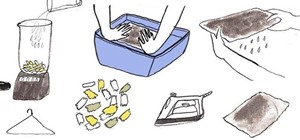


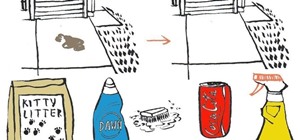

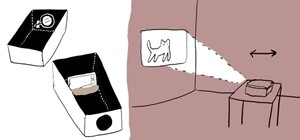

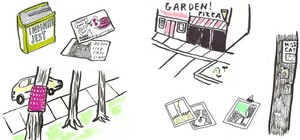

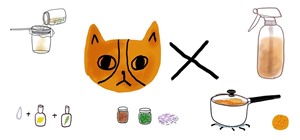

25 Comments
omg, does the computer one really work ?!?!? has anyone tried it?
I used to do it to revive first-generation NES cartridges. Maybe it's the same principle?
It works on hard drives, But you have to know what you are doing and have to do it fast. lets say you have a bad HD that will not spin anymore. try the freezer thing. Then plug in and copy all your info right away. Then do a HD check on it to see what the error was. Sometimes you can eve tap the HD if it still not spin up. You can freeze it for a couple days if it does not work right away. Sometimes it will just not work. Depending on what you have on there you can send it in to the company for recovery options but usually cost about 3 times as much as a new HD.
Nice, the envelope trick is clever.
I've never tried the denim trick, though I've read about it several times. Isn't the best thing about denim the fact that it wears in and fits to your body? I suppose if you buy those terrible jeans with fake rips, you would be weary about washing them.
you can use elastics in the freezer too :D for improving the lifetime :D
what kind of elastics?
ahh sorry xD the danish name is elastiker :D I meant "Rubber bands" ^^
I lived in copenhagen for 6 months.. my favorite word was "undskyld". Fun to say!
hahaha :D Awesome! :D
Do the same as with jeans. Put shoes in a plastic bag and put in the freezer for a few days. The odor and gems will be gone.
Not true, while the odour may be diminished for a while, bacteria are definitely not destroyed at this temperature. Most bacteria is killed above 63'c but below zero degrees the bacteria is merely dormant. They 'reawaken' at 1'c and start to reproduce, therefore the clothes will start to smell again as soon as they reach body temperature.
According to the USDA, freezing doesn't kill bacteria and other microbes, it just inactivates them: http://www.fsis.usda.gov/factsheets/Focus_On_Freezing/index.asp Some will then start growing again once they thaw, so your jeans will still be dirty and potentially disgusting.
The jeans thing is gross. Once they thaw out, they're still dirty! Wash by hand if machines damage them. The other tips are cool though.
To actually kill bacteria, you'd need a freezer that goes below -70 degrees celsius. While some microbes are suseptable to bursting due to the water content in them, most bacteria are suited to survive in such conditions because of their protective coatings. If putting something in a freezer actually killed bacteria, everytime we had a harsh winter in Canada, we would be living in a sterile country (if you exclude the bacteria that thrive in cold temperatures). If you put meat in the freezer, it will still go bad, it just takes MUCH longer.
Freezing also doesn't kill dust mites. My allergist specifically told me that in order to kill them you need to use the hottest possible water to wash your clothes, sheets, etc.
Things I don't think work: candles, hard drives, and, for the most part, batteries.
Here's the Santa Fe Candle Company's take on the candles:
Myth: putting candles in the freezer before burning makes them burn slower and last longer.
Well, true and not true. Yes, if you lower the temperature of the candle wax then the flame has to raise the temperature further to achieve evaporation and combustion. However, a candle flame burns at about 1800 K (3760 Fahrenheit). So the difference between the "frozen" candle and the room temperature candle (about 40 F) as compared to the difference between either and the burning temperature (about 3720 F) is negligible and certainly not worth the trip to the kitchen.
Hard drives. This is John Christopher, DriveSavers' Senior Data Recovery Engineer:
Hard drive head crashes and mechanical failures comprise approximately 60% of DriveSavers' hard drive recoveries and many computer geeks have heard about freezing the drive to shrink the platters. Basically you pop the hard drive in the freezer overnight and in the morning you quickly attach it to the computer and grab all the data. The theory is that the platters will shrink while cold and become "unstuck" from the drive head or casing, but according to Christopher this is bogus.
"If anyone got it to work, it was pure luck, I can't find any reasons why it would work and my clean room guys have never gotten it to work," Christopher told us. He added that water can condense on the hard drive platters after it has been take out of the freezer. "Then you get water spots which is really bad," he said.
I have personally tried the frozen drive recovery method. It did not work.
Here's what greenbatteries.com says about freezing batteries:
Alkaline batteries stored at "room temperature" self discharge at a rate of less than two percent per year. So normally refrigerating or freezing them will only help maintain their charge by a tiny amount. Hardly worth the effort of chilling them. However, if
sorry but i have taken hard drives apart and put them in the freezer and watched it fix drives that even drive savers said they couldn't recover...and before you tell me i have no knowledge of computers take this in to account 20+ years experience..i was working on them when they had free-on CFC gases in them and taking them apart was deadly...and they had that in them to make them work better humm wonder why freezing them makes them work DUH
I have to agree with DOnny here. I worked in IT for over 8 years now, and I have successfully recovered multiple HDD by freezing them. I must say it hasn't work for ALL of them, but more often than not, they come out working enough for me to pull data off them
The rest of the battery comment:
However, if alkaline batteries are stored at higher temperatures they will start to lose capacity much quicker. At 85 degrees F they only lose about 5% per year, but at 100 degrees they lose 25% per year. So if you live in a very hot climate or are storing your batteries in a very hot location, it may be worthwhile for you to store your alkaline batteries in a refrigerator instead.
NiMH and NiCd batteries self discharge at a MUCH faster rate than alkaline batteries. In fact, at "room temperature" (about 70 degrees F) NiMH and NiCD batteries will self discharge a few percent PER DAY. Storing them at lower temperatures will slow their self discharge rate dramatically. NiMH batteries stored at freezing will retain over 90% of their charge for full month. So it might make sense to store them in a freezer. If you do, it's best to bring them back to room temperature before using them. Even if you don't freeze your NiMH batteries after charging them, you should store them in a cool place to minimize their self discharge.
for this you are 100% right the best way to save batteries is have a liquid acid base battery and take out the acid and place it in plastic containers and keep it at 71.56 degrees dead on and constantly...chances of that happening NONE
1. Freeze the wet garment you are not ready to iron Freeze until you are ready to iron!
2. If your child comes back from scholl with a lice alert letter from the teacher, deep freeze all his garment,, coat, caps etc, bed sheets and all. 24 hours. Will kill the eggs.
I have used the freezer to get a electronic thermostat to come back to life and just today I used the freezer to get a wireless internet camera to work again. Can't explain why but it is worth a try. Nothing to loose.
Thanks for sharing your tips and personal experiences, everyone. Hearing first-hand experiences of what works and doesn't work really makes for great engagement.
My Samsung S3 died on me and after about 2 weeks, I thought, what the heck, let me try and start it. It started up immediately, but only for about 3 weeks and then it died again. This time, a friend told me to put it in the freezer for a while and then try and start it up. Since the phone was dead, I thought why not, it can't hurt. After about 30 minutes, I took it out and it started back up and lasted for about 1.5 months before dying...I put it back in the freezer and it lasted another 1 month...I put it back in and 2 - 3 weeks and then I dropped the phone and cracked the screen and it will not turn on any longer even if I freeze it. The freezing thing works, but I heard it must be placed into a frost free freezer, which I had always used to revive my Samsung S3. Any ideas why the freezer thing worked on a mobile phone? I don't understand it but it did work.
I'm not sure there is any hardcore research on why Li-ion batteries can be revived in a freezer, but some speculate that there is a build up of gunk in the interface between plates and electrolyte that kills the battery, and freezing forms ice crystals in the electrolyte that disrupts the inert gunk that killed the battery. Side note: a freezer has also been known to be an effective way to bypass lock screen security.
Share Your Thoughts